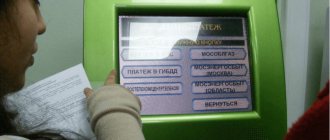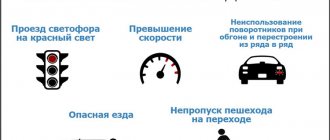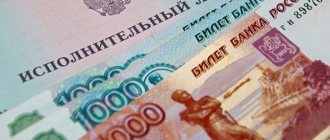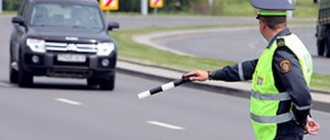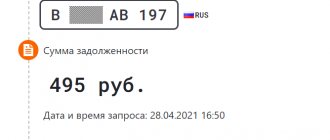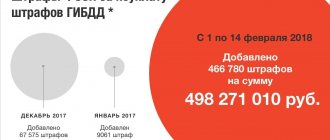Is this legal?
A vehicle (VV) is recognized as property, and therefore can be legally seized in the same way as other property. The presence of debts is a good reason for seizing property, because... compels the debtor to fulfill his obligations. During the period of its validity, the car owner loses the opportunity and right to dispose of the vehicle at his own discretion.
The fundamental document for the seizure of a car is the Law of the Russian Federation of October 2, 2007 No. 229-FZ “On Enforcement Proceedings” (as amended in 2021). In accordance with its Article 80, the arrest is carried out by a bailiff on the basis of a writ of execution, which contains a decision on recovery after the expiration of the allotted period. To carry it out, a court must recognize the owner of the car as a debtor.
In addition to depriving the owner of the right to use the vehicle, a registration arrest may be imposed. It leaves the possibility of driving a car, but excludes any re-registration (sale, donation, etc.). A ban on car registration may be imposed by:
- court;
- social protection authorities;
- credit organizations;
- investigative authorities and traffic police.
Normative base
The process of bringing to additional liability for non-payment of a traffic fine is regulated on the basis of several norms of the Code of Administrative Offenses of the Russian Federation:
- Article 32.2 of the Code of Administrative Offenses of the Russian Federation establishes the period during which the penalty must be paid;
- the statute of limitations for involvement is established on the basis of Article 4.5 of the Code of Administrative Offenses of the Russian Federation;
- the statute of limitations for payment is established under Article 31.9 of the Code of Administrative Offenses of the Russian Federation;
- liability for failure to pay the traffic police fine within the prescribed period arises on the basis of Article 20.25 of the Code of Administrative Offenses of the Russian Federation.
Certain points are regulated by judicial practice. Thus, Resolution of the Constitutional Court of the Russian Federation dated May 23, 2017 N 14-P determined the legality of Article 31.9 of the Code of Administrative Offenses of the Russian Federation and established a number of features of its practical application.
If there are still controversial issues, you can also consult for free via chat with a lawyer at the bottom of the screen or call the following numbers:
7
Moscow;
7
Saint Petersburg;
7
Free call for all of Russia.
In what cases is it possible?
The purpose of seizing a vehicle is to prevent the destruction or sale of equipment until the final resolution of the controversial situation (voluntary repayment of debt or confiscation of property by court). It may be caused by the following circumstances.
Credit car
A car, as an expensive property, often becomes collateral when taking out a large loan from a bank. In addition, banks provide special car loans for the purchase of a vehicle, and until the loan is fully repaid, the car becomes collateral. The fact that the car is pledged is necessarily reflected in the contract .
If the borrower for any reason stops fulfilling its payment obligations, the credit institution goes to court, which makes an appropriate decision to repay the debt. It is transferred to the FSSP, and at the request of the bank, bailiffs seize the pledged car.
Non-payment of alimony
In accordance with Article 113 of the RF IC, bailiffs accrue arrears in the payment of alimony . The ex-wife or guardian files an application to the court if the father evades the established payments for child support.
The court may make a decision to seize property, which is executed by bailiffs. In this case, the car can become seized property if it is not a means of transportation for a disabled person or a means of receiving official income.
Debt on traffic police fines
Often, vehicle owners ignore fine payments issued for traffic violations . As a result, a significant amount of debt can accumulate. The traffic police has the right to impose a registration ban and go to court to force the payment of fines.
In principle, the basis for arresting a vehicle is the recognition of its owner as a debtor in court for various reasons. Such a claim may be filed by the management company or organizations providing housing and communal services in case of evasion of payment of utility bills. A valid reason is failure to pay administrative fines for various offenses. Debts may arise during the division of property in court.
A demand for debt repayment can be made by any legal entity or individual who can prove its existence. In all cases, the court may decide to seize property .
We discussed in more detail all the grounds on which a car can be seized in this material.
Punishment for delay
A late fine is a fine that has not been paid within 60 days of the effective date of the order. The resolution comes into force 10 days after the penalty is imposed, that is, any traffic police fine is considered late if it is not paid within 70 days.
We suggest you read: How to re-register a summer cottage for your daughter
After this period, the case of unpaid collection is sent to court. In this case, bailiffs take charge of the violator, whose task is to do everything so that the debtor pays the traffic police fine.
There is a penalty for an overdue traffic fine. The first thing that the bailiffs will do is to impose an obligation to pay a penalty of double the amount. And this is the minimum that can be expected. Other options:
- arrest for 15 days;
- compulsory work for 50 hours;
- a ban on traveling abroad if the debt amount exceeds 10 thousand rubles or if there are 10 unpaid fines.
What will be applied to a specific violator is determined by the bailiffs. At the same time, they consider whether the violator is malicious (how often he is fined, whether there are precedents for non-payment). Other aspects are also taken into account, including the financial situation of the debtor.
Do I need to pay a fine if the resolution is not received? Yes need. If the violator did not receive a notification letter (for example, he was on a business trip or undergoing treatment), then the resolution begins to take effect from the moment the letter is returned to the traffic police. The first day of the deadline will be the return stamp of the letter.
At what amount of debt can bailiffs seize a vehicle?
The law does not stipulate a limit on the minimum amount of debt at which a vehicle can be seized. However, the court must take into account the principle of proportionality, i.e. The appraised value of the car should cover debts and legal costs, but not greatly exceed them. At the same time, if there is no other property sufficient to pay off the debt, the debtor can be forced to sell the car on his own and pay the required amount.
When making a decision to seize a car, the principle of priority must also be observed. First of all, bank accounts are checked and, if necessary, they are seized. If the debtor does not have them, then the property indicated by him is taken into consideration. Luxury items follow. Only after the listed property does the turn come to the car. The above does not apply to credit and pledged vehicles.
Nuances
Failure to pay a traffic fine will result in additional liability. It is worth paying attention to some practical features that arise in such situations:
- In addition to an additional fine, an enforcement fee may be collected for each enforcement proceeding. The minimum amount is 1000 rubles. If the initial penalty was 500 rubles, such a punishment is quite significant.
- Payment of the enforcement fee can be avoided by paying off the debt before the initiation of proceedings.
- A citizen has the right to ask the court to apply an alternative punishment or, conversely, to use a monetary penalty instead of arrest or labor. But the final decision is made only by the court, guided by available factors and general principles of legal proceedings.
- In practice, fines of double the amount are most often applied.
- A person cannot be held liable if the statute of limitations has expired.
It is not recommended to take the traffic police fine to the point of applying additional liability, since the matter may not be limited to double penalties. The person is charged an enforcement fee, and other liability measures are applied. If it is impossible to pay immediately, you can ask the court to defer execution or pay by installments.
Lawyer. Engaged in private practice. Experience working with government agencies, including the traffic police. Regular judicial practice in civil and administrative areas.
Consequences
The seizure of the car should be considered as a temporary measure forcing the debtor to repay the debt. However, if the court decision is evaded, more effective measures can be taken. The most radical of them is the seizure (confiscation) of the vehicle.
Do bailiffs have the right to seize a vehicle?
The court decision specifies the period for repayment of the debt . After its completion, the FSSP service has the right to seize the seized vehicle. With the participation of witnesses, a seizure report with an inventory is drawn up. The debtor is given 5 days to pay debts or appeal the action, and then the vehicle is transferred to the creditor bank or the Federal Property Management Agency for sale through an auction or in another manner prescribed by law. The difference between the debts and the cost of the car is returned to its owner.
What to do if your car is seized?
The arrest can only be lifted upon completion of enforcement proceedings under the following conditions:
- fulfillment by the debtor of all his obligations, repayment of debt;
- initiative of the applicant (plaintiff) in reaching a compromise solution;
- court decision on the unlawfulness of the arrest;
- termination of proceedings by court decision.
The procedure for the vehicle owner depends on the reasons for the arrest . First of all, you should find out them. To do this, you can use the traffic police and FSSP database by going to the official website (read here how you can check whether a car has been seized). If the arrest is made in full compliance with the law, then it is best to find funds and pay off the debt.
After this, you must submit a document confirming payment to the bailiffs. After an appropriate check, they will lift the arrest within 24 hours. To terminate registration restrictions, you must submit an application to the traffic police, attaching the bailiff's decision and payment documents.
Another option is a peace agreement with the creditor . If it is possible to agree on a change in the timing of payments, the plaintiff must withdraw his application from the court. The judge will make an appropriate decision to terminate the enforcement proceedings. Please note that the registration restriction may be maintained until the debt is fully repaid.
Finally, in case of violations committed during the seizure of the vehicle, or a controversial situation arises, you can appeal to a higher court. This will require strong evidence that you are right. Until a new decision is made, the process of arrest and seizure may be stopped.
We tell you more about what to do if your car is seized and how to lift the restriction here.
Deadlines for payment of traffic police fines in 2021
If it is listed, you need to remember whether there was a violation. To do this, you need to study the resolution. If there was an incident, payment must be made as quickly as possible. If you don't pay it, the consequences will be unpleasant.
We invite you to read: The traffic police fine has been handed over to bailiffs, what to do?
If you cannot remember the situation with the violation, and the driver drives according to the rules, you can try to challenge the fine. It's difficult, but real.
Payment
Before paying overdue traffic fines, you need to clarify the amount, because the collection could double and the penalty increase. You will also need payment details, which should appear on the receipt. Any payment methods - the fact that it is overdue does not affect the payment method. The methods are as follows:
- at a bank branch through a cash desk;
- through an ATM or self-service terminal;
- using the websites of the State Traffic Safety Inspectorate or State Services;
- using online wallets.
When paying not through a bank cash desk, the commission may be higher. If the fine is substantial, then it is more profitable to pay it through the bank. Regardless of the payment method, you must check the details and accounts for transferring the amount so that there are no problems in the future.
Bank cards and accounts may be blocked as part of enforcement proceedings. This is done in the case when the debtor does not fulfill his obligation voluntarily and the bailiff service is involved in the case.
In this case, it will not be possible to unblock the card before the obligation is fulfilled, since the arrest is imposed for the purpose of writing off the funds that may come to the card. The exception is if the account is special. Bailiffs often seize cards that are used to receive children's money or other social benefits. In this case, you need to contact the FSSP and write a statement.
If your account is blocked for non-payment of a traffic fine, it is recommended to immediately contact the bailiff service and pay off the existing debt. After this, the account will be unblocked. If this does not happen, you should write an application for such an action, and if there is no response to it, file a complaint with a higher authority or in court.
